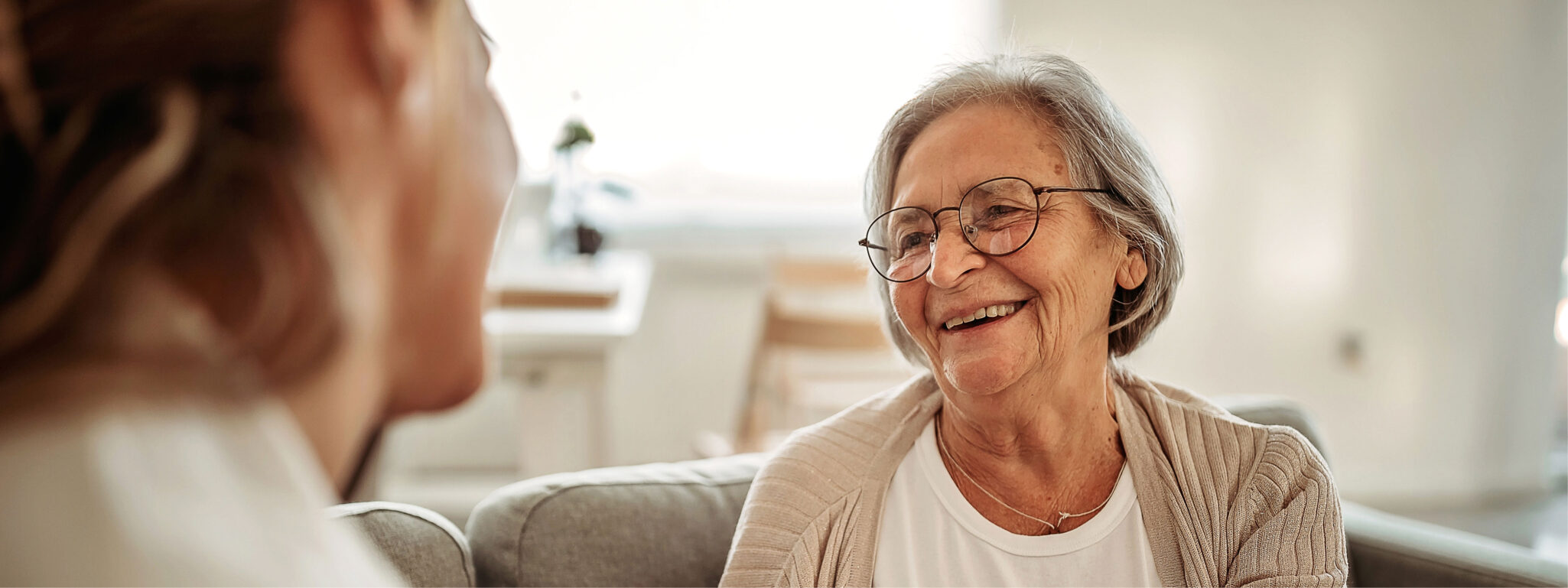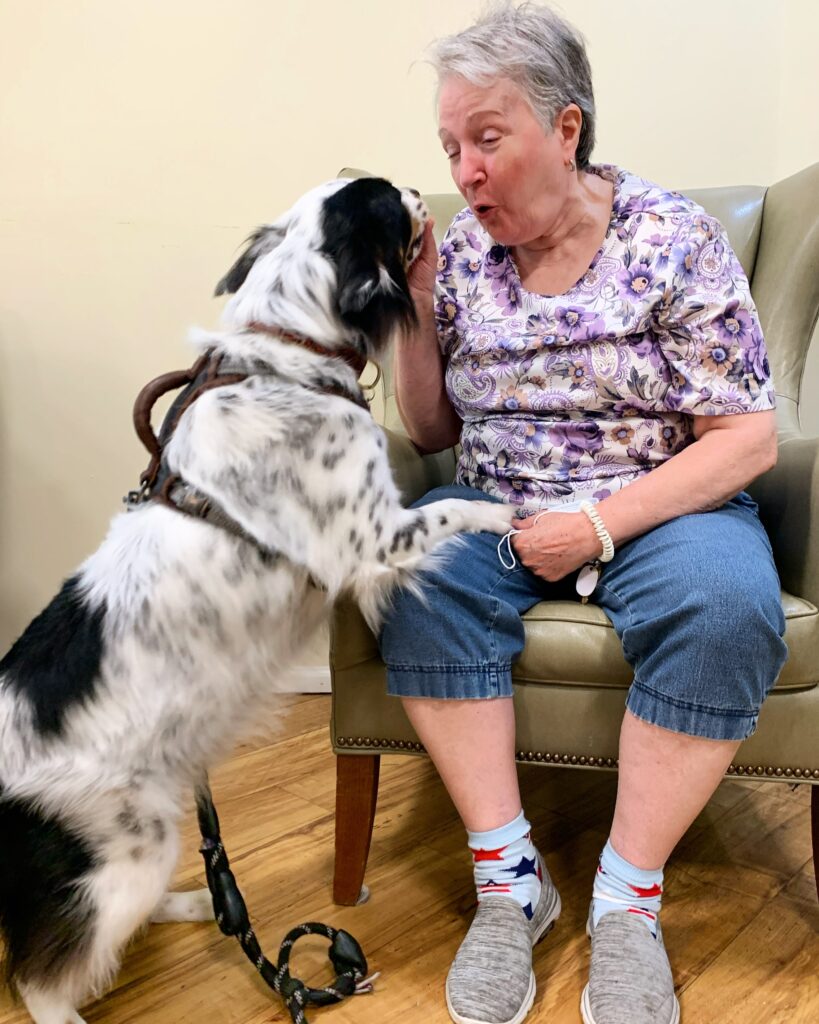“Physical touch is so important. The hugs and kisses the residents share with the animals provide so much love,” said Anne Stumpf, Manager of Lifestyle Enrichment at Richmond Terrace, a Lutheran Senior Services Assisted Living Community, who provides pet therapy for her residents.
Pet therapy, or animal-assisted therapy, uses dogs or other animals to help people recover from or better cope with health problems, such as heart disease and mental health disorders, according to the Mayo Clinic. It has been shown to alleviate anxiety, support memory care, reduce stress, encourage physical activity, and improve heart health. Many of our compassionate assisted living care communities include animals into their programs, whether that’s through resident pets or regular visits because they see that pet therapy benefits seniors.
Richmond Terrace is one LSS community that is rich in animal interaction opportunities! Anne and her colleague Cindy Pallme each bring their personal dogs, Gilly and Malibu, to Richmond Terrace every Friday. The community also has an aviary, monthly visits of kittens from the Animal Protective Association, and Anne uses her personal connections to bring everything from ducks to baby rabbits for residents to enjoy. She sees many benefits in animal-human interaction.
Pet therapy alleviates anxiety levels in older adults
Numerous studies have shown that animal visitation programs reduce feelings of loneliness and anxiety for older adults. According to studies featured in the National Library of Medicine, interacting with animals can stimulate the peptide hormone oxytocin, which is linked to warm, fuzzy feelings and shown in some research to lower stress and anxiety. Oxytocin affects human emotional responses including trust, empathy, positive memories, and positive communication. Oxytocin is also connected to serotonin and dopamine, often referred to as the “happy hormones.”
“Animals provide a real dopamine boost to the residents,” said Anne. She shared a story of a resident who is in professional hospice care and has developed a special bond with Gilly. Anne and Gilly make personal visits to the resident’s room every week. “Gilly knows which room to go to! She calls Gilly ‘my dog’ and says that the visits are her favorite part of the week,” said Anne.
Pet therapy supports memory care in older adults

Pet therapy also has been shown to be helpful with residents experiencing memory loss and can be a useful tool in building supportive environments for loved ones with memory issues.
A study showed that residents of a senior community with a resident dog reported less tension and confusion in comparison to residents of a home without a dog.
Other studies also have concluded that dog-assisted therapy reduces restlessness in older adult patients with dementia. It has even been shown that individuals with dementia socialize more and have more positive social interactions when animals are present.
Spending time with an animal can spark and rekindle positive memories. Chuck, a Richmond Terrace resident, recently stroked Gilly and shared stories of his own Pomeranians and their antics. “She reminds me of my dogs,” he said. Another resident, Joan, reminisced about her schnauzer. “I miss my dog. Gilly is a beautiful dog and so smart!” said Joan while cuddling Gilly.
Pet therapy reduces stress levels

Those “happy hormones” also have been shown to reduce levels of stress-related hormones, like cortisol. Human-animal interaction studies provide direct evidence that interaction with a friendly companion animal reduces the levels of stress hormones.
Having the unconditional affection of an animal is a wonderful stress reducer. Doris, a Richmond Terrace resident, loves to visit with Gilly and Malibu each week. Doris makes special trips to the front desk to share some affection with Malibu. “She likes to kiss me, and I like to kiss her!” said Doris. “She makes me happy.”
Animal interaction encourages physical activity
Pet owners, particularly dog owners, report improved health outcomes simply due to the physical activity required to care for the animal. Spending time with animals increases opportunities for exercise and outdoor activities, which can result in better cognitive function in older adults. Regular walks aren’t just good for Fido! But you can benefit from animal interaction even if you don’t own a pet.
Cindy shared a story of one Richmond Terrace resident who was fearful of dogs, having been bitten as a child, and initially avoided Malibu when she was at the community’s front desk. Over time the resident has seen how gentle Malibu is and has overcome her fear of dogs. “Now she comes over at least four times a day to visit with her!” said Cindy. Walking to the front desk and playing with Malibu increases the resident’s physical activity and socialization, both of which are great ways to improve one’s physical and cognitive health!
Pet therapy improves heart health
Pet therapy does a heart good! A study found that dog and cat owners were less likely to take medication for heart problems than non-pet owners. One study investigated one-year-survival in a group of several hundred patients with acute myocardial infarction. High social support and owning a dog predicted survival after 1 year. Another set of studies concluded that there is consistent evidence for a protective effect of pet ownership against cardiovascular risk.
Many studies show that the presence of friendly animals, both familiar or unfamiliar, can significantly reduce heart rate and blood pressure.
Pet therapy benefits older adults

Pet therapy for seniors has been shown to alleviate anxiety by reducing loneliness, support memory care by increasing positive socialization, reduce stress by regulating hormones, encourage physical activity, and improve heart health.
And animal visits are fun! Gilly and Malibu are the stars of Richmond Terrace’s Friday Happy Hours. While Malibu is passed around and fawned over, Gilly performs tricks like jumping through hoops and helps clean up any dropped popcorn. “One is a show dog, the other is a show-off!” said Anne.


